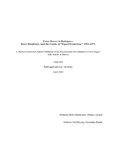From Brown to Rodriguez: Race, Residence, and the Limits of "Equal Protection," 1954-1973 (thesis)

View/
Author
Still, Anna Kathryn
Subject
Washington and Lee University -- Honors in History
School districts -- Finance
Discrimination in education
United States. Supreme Court
Segregation in education -- U.S. states
Metadata
Show full item recordDescription
Thesis; [FULL-TEXT FREELY AVAILABLE ONLINE] Anna Kathryn Still is a member of the Class of 2019 of Washington and Lee University. The Supreme Court's 5-4 decision in Rodriguez did not acknowledge wealth as a suspect class, decided education was not a fundamental right, and chose not to consider the issue of race. By reversing the decision of the district court, the Supreme Court failed to protect the underprivileged, mostly minority children both in San Antonio and across the country. In addition to the negative impact that Rodriguez had on low income children, it marked an important philosophical shift in the jurisprudence of the Supreme Court.
Access to education is an essential part of American life, and the ability to receive a high quality education is especially important for those who come from struggling financial backgrounds. In order to improve their opportunities, children from low-class families deserve the ability to receive more than an inadequate education. By declaring that education was not a fundamental right, Rodriguez acted as "the practical invalidation of Brown v. Board." Additionally, Rodriguez essentially eliminated the federal courts as a way to reform school finance. [From Conclusion] Anna Still